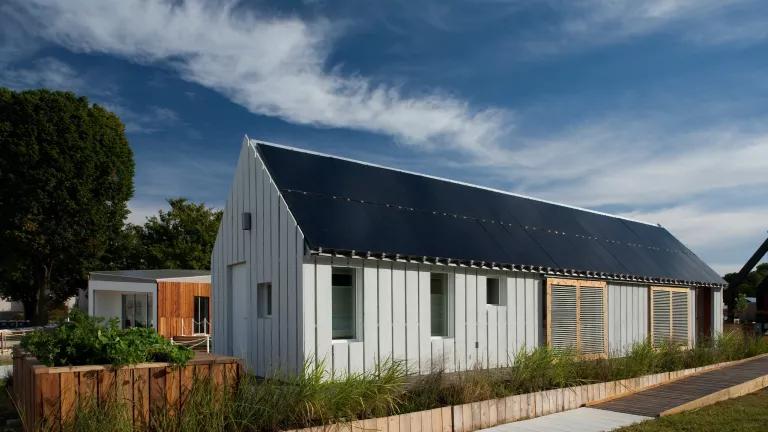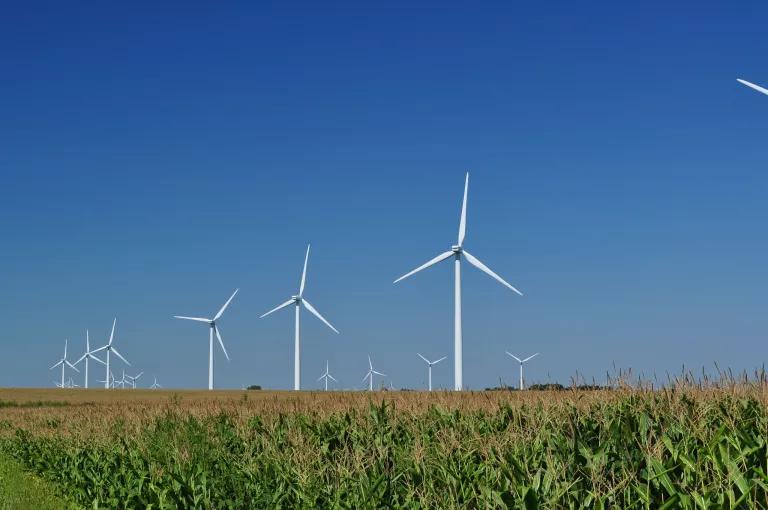Illinois’ Recovery Starts with the Clean Energy Jobs Act
The Clean Energy Jobs Act is an essential part of Illinois’ economic recovery. It protects public health and creates good-paying jobs, while ensuring that the people most in need of good jobs and clean air are at the front of the line.

Photo by U.S. Dept. of Energy
The Clean Energy Jobs Act is an essential part of Illinois’ economic recovery. It protects public health and creates good-paying jobs, while ensuring that the people most in need of good jobs and clean air are at the front of the line. It will save Illinoisans money.
This is the third blog in a series; the first discussed how the COVID-19 pandemic has highlighted many of the inequalities that already existed in our society; the second suggested guiding principles for our recovery to create a “new normal” that is more equitable and sustainable, and asked the question: how do we rebuild in a way that creates lots of good-paying jobs, while establishing a new normal for Illinois that’s more equitable, healthier, and more sustainable?
That rebuilding starts with the Clean Energy Jobs Act (CEJA).
CEJA will move Illinois to 100% clean energy and bring the good-paying jobs that come with it. It will provide a just transition away from dirty fossil fuels that make us sick (especially people of color) and our planet hot. It will clean up our dirty transportation sector, and it will center equity at every step of the way as we expand our clean energy economy.
Clean energy, like all sectors of the economy, has taken a hit during the pandemic. But it has a record of explosive growth, job creation in both rural and urban areas, and it provides significant benefits to our health and environment. Combined with the right public policies - particularly those like CEJA, that center equity and give communities a seat at the table—clean energy can be a central driver of Illinois’ post-pandemic economic recovery. Here’s how:
Moving Illinois to 100% clean energy will drive growth in what are already the two fastest-growing jobs in America: solar installers (averaging $21.58 an hour with a high school diploma) and wind turbine technicians (averaging $25.44 an hour with vocational training). Insulation workers, who install cost-saving energy efficiency measures, make an average of $28.60 an hour in Illinois.
Clean energy creates jobs in every corner of the state: in fact, pre-COVID-19, clean energy jobs grew at 5.5% per year in rural Illinois, even as the overall number of rural jobs in the state declined.
In addition to renewable energy (like wind and solar), CEJA would expand energy efficiency, which provides substantial cost savings to consumers and creates jobs for tens of thousands of Illinoisans as well. Energy efficiency already adds $700 million per year to Illinois’ economy, and additional energy efficiency improvements in CEJA would create an additional $700 million in economic benefits each year.
CEJA also creates pathways to these good-paying clean energy jobs for the people who need them most, like people in environmental justice and disadvantaged communities, and workers displaced by the ongoing decline of fossil fuels. Not just by providing training in a vacuum but creating a full career pipeline: outreach to make sure people are aware of opportunities, training with stipends for those who need them, and incentives for clean energy companies to hire newly-trained Illinois workers and pay them good wages.
Companies that do right by their employees and the communities where they work (for example, through community benefits agreements, like this one with a Chicago cannabis operator) will have a big leg up under CEJA, and will be at the front of the line for contracts to build clean energy.
A just transition to 100% carbon-free power. Dirty coal plants cause an estimated 339 deaths each year in Illinois, and spew pollution that is associated with a higher risk of death from COVID-19. Like COVID-19, they disproportionately impact already-vulnerable people: 40% of people who live near a coal-fired power plant in Illinois are people of color and 38% have low incomes. If Illinois is going to make health outcomes for its residents more equitable, it must reduce the disparate burden people of color face from pollution.

Photo: Tom Shockey
While the move away from coal is already happening, it’s not happening fast enough to preserve a livable climate, and frustratingly, it’s happening mostly on the terms of big, out-of-state companies while leaving workers and communities high and dry.
CEJA would create a plan for a deliberate move away from coal between now and 2030, but critically, when fossil fuel plants close, it would give communities and workers impacted by that closure a seat at the table to decide how and when it happens. It would also provide economic development incentives for communities where coal plants have recently closed, and for workers, help protect their benefits in the medium term and give them access to higher education and vocational training in the long term—so they can make their own decisions about what’s next for them.
CEJA will modernize our electric grid—and the way we run it, plan it, and design it—to save Illinoisans money and enable more electric vehicles and other forms of clean transportation. Transportation pollution also falls inequitably on people of color, and transportation is now the largest source of planet-warming pollution in Illinois (surpassing the electric sector). Reducing air pollution is a critical step towards reducing the kind of chronic respiratory problems that have put many people at higher risk of death from COVID-19. We can clean our air by moving towards cleaner transportation, while helping consumers and the economy.
Ambitious action on clean transportation would save Illinoisans nearly $2 billion on their electricity bills, and more than $35 billion on gas and maintenance for their cars. In-state demand for electric vehicles will also be an asset for manufacturers like Rivian, where hundreds of workers (practicing strict safety measures) have resumed construction on its $29 million factory in Normal, Illinois.
The pandemic has had dire consequences for both our health and our economy, and laid bare the stark racial inequality that persists in our state and our country. The road to recovery will be difficult, but we can choose to learn from our mistakes and move away from the dirty fossil fuel economy and the damage it’s done.
We can make our recovery an equitable, sustainable one, and position Illinois as a national leader on clean energy. We can stop our energy systems from sickening and excluding people of color. We can bring good-paying clean energy jobs to Illinois while preserving a livable planet.
All that starts with the Clean Energy Jobs Act.



